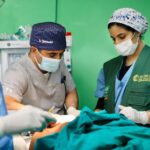By Hassan Zaggi
In an effort to attain health security in the continent, the Africa Health Budget Network (AHBN) has supported 8 countries in Africa to develop in-country advocacy action plan.
It has also supported the countries to strengthen health security mechanism and also put in place health security agenda.
The Coordinator, AHBN, Dr. Aminu Magashi, disclosed this at the end of the 3-day Africa Regional Summit for NGOs and Media in Abuja, Nigeria.
The 3-day Summit was organized by the AHBN with funding from Ford Foundation.
The Summit which was attended by NGOs and media from 8 African countries including Cameroon, Kenya, Malawi, Nigeria, Sierra Leone, Senegal, Uganda, and Zimbabwe was with the theme: Capacity Building, Peer Learning and Exchange on Accountability for Domestic Resource Mobilization for Health Security and Systems in Africa.
The objectives of the summit include to enhance capacity of delegates on budget analysis, budget advocacy, accountability and transparency for Domestic Resource Mobilization (DRM) in relation to health security; promote peer learning and exchange among country delegates on Accountability for Domestic Resource Mobilization for Health Security and Systems in Africa and revise and adopt country workplans based on the project sub grants agreements.
Responding to questions from journalists, Dr. Magashi said: “I am very happy, excited and passionate that we have already established the Africa health security planning hub. This is not government. It is AHBN health security learning hub.
“We are now members and delegates of this summit. We are going to expand it so that NGO leaders in other African countries can join so that we can continually learn, help and support each other.
“If there are opportunities for grants, funding, projects, for partnership, we will be sharing on the learning hub. This is a very big achievement of the summit.”
He explained that health security are activities that will help countries in Africa to contend the spread of infection and disease outbreaks.
It is, according to him, the ability of countries within the region to prevent proactively, contend and control if there is any problem, especially outbreak of disease(s).
Responding to a question on what is needed for each country to attend health security, Dr. Magashi said: “Every country must do a costing of what is needed. Sometimes it is not about having money. It could a well-trained human resource for health in a particular country.
“You must have enough human resources in the airport so that when people are coming into the country, they have the capacity to do screening and also provide services.
“There should be enough manpower at the border so that when people are coming in they can be screened. There must also be enough manpower at the sea border.
“It means it is not about finances, you need to have human resources and also surveillance. The ability to trace a particular infection and also check everywhere to ensure that if there is suspicion for any outbreak, the government can quickly respond and contain it.
“It is a collective survival approach and coordination that will help any country to improve health security agenda.”
He, however, insisted that every government must have a national action plan for health security.
On his part, the Chairman, National Advocate for Health (NA4H), Hon. Mohammed Usman, called on countries in the region to prioritise health and put in place machinery that can contend with disease outbreaks in the future.
He advocated for more budgetary provision for emergencies so as to be able to address any form disease emergency in the continent.
Speaking on the need for the current government in Nigeria to review the health budget upward and commensurate releases, he lamented that: “When you look at the history of budgetary provision for health in Nigeria, can we say we are satisfied with the way it has been? With the exception of this year’s budget which is around 6 per cent or there about, but even then, can we lay our hands on the total amount that has been released from this year’s budget?”
While lamenting that health has not been given top priority by successive governments over the years in Nigeria, the former lawmaker said: “Up till now health has not been a priority of government in Nigeria.
“The past government fail to prioritise health and even the current government, I don’t think, there is any indication that they will prioritise health.
“Except health is considered a top priority, it will not receive the necessary attention.
“For example, the whole idea behind this summit is the issue of health security. What do we put in place to prepare countries in Africa against the next pandemic, have we learnt lessons with the COVID given the destruction it caused in Nigeria, other parts of Africa as well as the world over? Have we changed the way we are doing things? Have we changed the budgetary provision for health emergency?”



